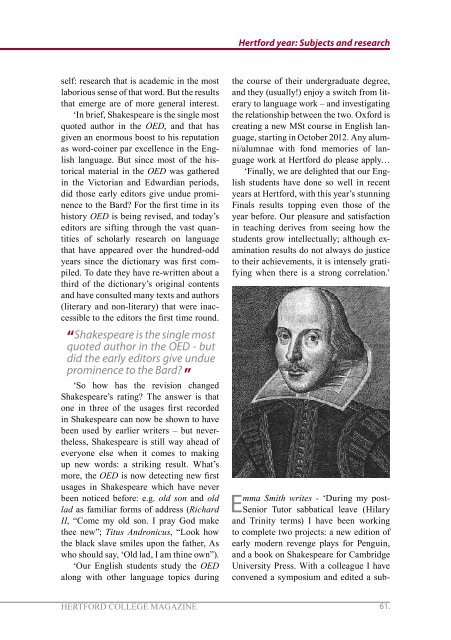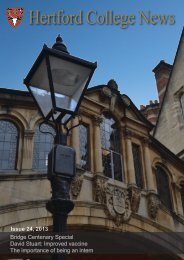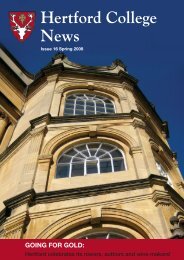2011 Hertford College Magazine (Issue 91)
2011 Hertford College Magazine (Issue 91)
2011 Hertford College Magazine (Issue 91)
Create successful ePaper yourself
Turn your PDF publications into a flip-book with our unique Google optimized e-Paper software.
self: research that is academic in the most<br />
laborious sense of that word. But the results<br />
that emerge are of more general interest.<br />
‘In brief, Shakespeare is the single most<br />
quoted author in the OED, and that has<br />
given an enormous boost to his reputation<br />
as word-coiner par excellence in the English<br />
language. But since most of the historical<br />
material in the OED was gathered<br />
in the Victorian and Edwardian periods,<br />
did those early editors give undue prominence<br />
to the Bard? For the first time in its<br />
history OED is being revised, and today’s<br />
editors are sifting through the vast quantities<br />
of scholarly research on language<br />
that have appeared over the hundred-odd<br />
years since the dictionary was first compiled.<br />
To date they have re-written about a<br />
third of the dictionary’s original contents<br />
and have consulted many texts and authors<br />
(literary and non-literary) that were inaccessible<br />
to the editors the first time round.<br />
“ Shakespeare is the single most<br />
quoted author in the OED - but<br />
did the early editors give undue<br />
prominence to the Bard? ”<br />
‘So how has the revision changed<br />
Shakespeare’s rating? The answer is that<br />
one in three of the usages first recorded<br />
in Shakespeare can now be shown to have<br />
been used by earlier writers – but nevertheless,<br />
Shakespeare is still way ahead of<br />
everyone else when it comes to making<br />
up new words: a striking result. What’s<br />
more, the OED is now detecting new first<br />
usages in Shakespeare which have never<br />
been noticed before: e.g. old son and old<br />
lad as familiar forms of address (Richard<br />
II, “Come my old son. I pray God make<br />
thee new”; Titus Andronicus, “Look how<br />
the black slave smiles upon the father, As<br />
who should say, ‘Old lad, I am thine own”).<br />
‘Our English students study the OED<br />
along with other language topics during<br />
HERTFORD COLLEGE MAGAZINE<br />
<strong>Hertford</strong> year: Subjects and research<br />
the course of their undergraduate degree,<br />
and they (usually!) enjoy a switch from literary<br />
to language work – and investigating<br />
the relationship between the two. Oxford is<br />
creating a new MSt course in English language,<br />
starting in October 2012. Any alumni/alumnae<br />
with fond memories of language<br />
work at <strong>Hertford</strong> do please apply…<br />
‘Finally, we are delighted that our English<br />
students have done so well in recent<br />
years at <strong>Hertford</strong>, with this year’s stunning<br />
Finals results topping even those of the<br />
year before. Our pleasure and satisfaction<br />
in teaching derives from seeing how the<br />
students grow intellectually; although examination<br />
results do not always do justice<br />
to their achievements, it is intensely gratifying<br />
when there is a strong correlation.’<br />
Emma Smith writes - ‘During my post-<br />
Senior Tutor sabbatical leave (Hilary<br />
and Trinity terms) I have been working<br />
to complete two projects: a new edition of<br />
early modern revenge plays for Penguin,<br />
and a book on Shakespeare for Cambridge<br />
University Press. With a colleague I have<br />
convened a symposium and edited a sub-<br />
61.




